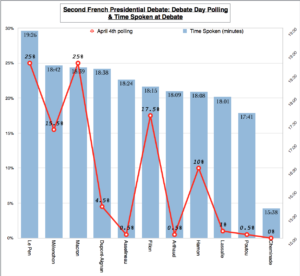French Presidential Front-Runners Survive Second Live Debate
Macron won the French presidential election on May 7, 2017. However, it is also important to look back at past presidential debate to reflect on what values, issues and problems the presidential candidates had to face this year. This is an article written in April and now that the French president has been chosen, the question of who is going to win may not be as relevant. However, it does show the dynamics of the live debate and how much these conversations affected the popularity of the candidates.
With only 19 days until the first round of the French presidential election, 11 candidates faced-off in the second of three live television debates on April 4. For the first time in French election history, all candidates were included on the stage, offering lesser-known candidates a chance to share their ideas with the French people. Asking for concrete plans, the debate revolved around four themes — jobs, security, political life, and the candidates’ implementation of social models.
Going into the debate, the race’s front-runners included centrist Emmanuel Macron and the National Front’s Marine Le Pen. In the debate, televised by BFMTV/CNews, Macron presented himself as the “genuine alternative” to a political system apathetic to reform and said he wants to “find the optimism of the French people again” to solve contemporary challenges facing France.
Le Pen, on the other hand, spoke of a France confronted by “economic and social disorder,” which she attributed to “Islamic terrorism” and “savage globalization” and presented herself as the protector of the French people’s speech, income, and order.
The debate enabled those trailing in the polls to confront the front-runners, and they put noticeable pressure on Macron and Le Pen. Professor Christian Delporte, of l’Université de Versailles-Saint Quentin, told Le Figaro that “Macron had great prudence” and Le Pen “was on the defensive” throughout the debate.
The IFOP-Fiducial poll had both Macron and Le Pen at 25 percent before the debate. The following day, the poll showed that Le Pen remained at 25 percent, but Macron dropped to 24.5 percent— although the 2% margin of error means both are still virtually neck-and-neck.
While this bodes well for the Macron and Le Pen camps, it was the Unsubmissive France party candidate, Jean-Luc Mélenchon, who made a mark on viewers. In the Elabe/BFMTV poll taken after the debate, 25 percent of respondents said Mélenchon was the most convincing during the debate, followed by 21 percent choosing Macron, and only 11 percent opting for Le Pen. Mélenchon could very well overtake third-placed François Fillon, who led IFOP-Fiducial polls until a corruption scandal surfaced in which he was accused of using public funds to pay his wife and children’s salaries.
In contrast to Macron and Le Pen, Mélenchon “maintained distinction” and “talent as an orator”, remarked Pascal Perrineau — political scientist and professor at Sciences Po — on the candidate’s performances throughout the debate, in Le Figaro.
By: Theo SymondsBy: Theo Symonds

The French will vote in the first round of the presidential election on April 23. If no candidate receives a majority, the second round of voting will only include the two top candidates, to be held on May 7.
